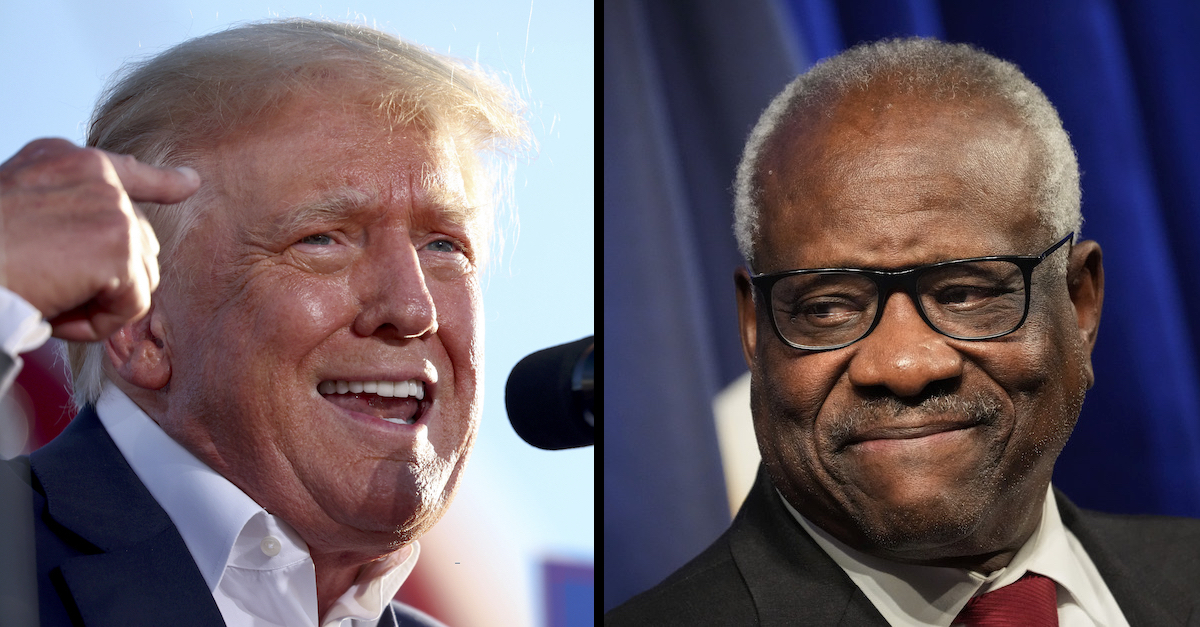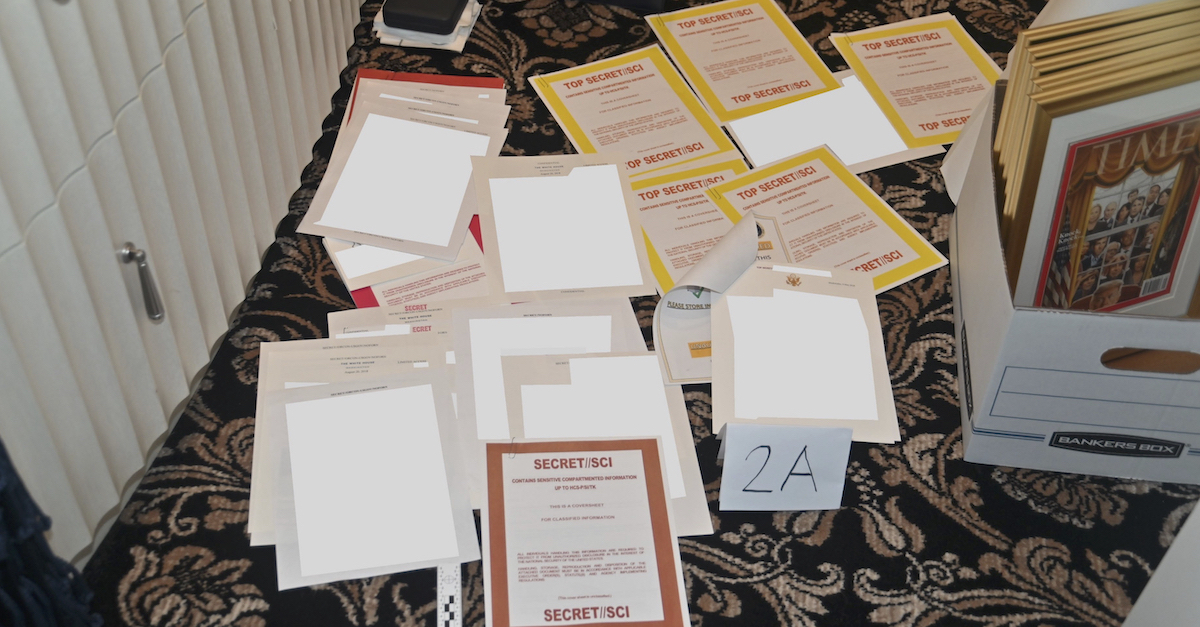
Former U.S. President Donald Trump spoke during a campaign rally on October 9, 2022. Justice Clarence Thomas was seen at a Heritage Foundation function on October 21, 2021.
Siding with the U.S. Department of Justice, the U.S. Supreme Court on Thursday refused to accept an application by former president Donald Trump to vacate a circuit court ruling connected to a search executed at Mar-a-Lago.
Trump filed the application with Justice Clarence Thomas on Oct. 4. The U.S. Department of Justice, via Solicitor General Elizabeth Prelogar, asked the Court not to take the case.
On Thursday, the Court agreed with Prelogar and the U.S. Government.
Trump filed the petition before Thomas because he is the justice who handles incoming matters from the 11th Circuit Court of Appeals. Within that circuit sits Mar-a-Lago and the lower court case in question.
Justice Thomas referred Trump’s application to the full Court for consideration on Thursday, the Court’s docket indicates.
“Application (22A283) to vacate the stay entered by the United States Court of Appeals for the 11th Circuit on September 21, 2022, presented to Justice Thomas and by him referred to the Court is denied,” the Supreme Court’s docket reads.
There were no noted dissents.
At issue are documents seized by the FBI from the former president’s palatial home and resort facility on Aug. 8 pursuant to a search warrant signed by a federal magistrate judge in Florida. The U.S. Department of Justice has characterized some of the material as both classified and secret — to varying levels of severity. Specifically, the DOJ told the Court that “the search recovered roughly 100 records bearing classification markings, including markings reflecting the highest levels of classification and extremely restricted distribution.”
The DOJ has characterized the dispute about the material, which Trump took to Florida after he vacated the White House, as a criminal investigation under the Espionage Act. No criminal charges have been filed over the matter. Trump and his attorneys have countered by suggesting that the locus of the dispute is the Presidential Records Act, which they say affords Trump broad powers when it comes to the material in question from his administration.

Federal prosecutors say FBI agents seized these materials from Mar-a-Lago. The contents of the documents were redacted with white squares. (Image via an Aug. 31, 2022 federal court filing.)
Trump filed a concomitant lawsuit against the U.S. Government to assert various forms of privilege and other protections surrounding the documents. U.S. District Judge Aileen M. Cannon ordered a special master — Senior U.S. District Judge Raymond Dearie — to review the material and to ferret out any claims of privilege.
One of the privileges asserted by Trump is executive privilege. The DOJ has long averred that Trump, as a former executive, cannot assert that type of privilege against the administration of Joe Biden, the current executive, because the privilege belongs to the branch of government itself and not to the specific individual who from time to time may be the elected president.
In asking the Supreme Court to hear the matter, Trump’s attorneys suggested that federal prosecutors were trying to “pin some offense on him” through a scurrilous charade of “political judicial theater.”
Trump wanted the Supreme Court to vacate the stay issued by the 11th Circuit Court of Appeals. The circuit court’s stay had in turn paused the implementation of an order by District Judge Cannon.
To explain, it’s necessary to unwind the clock.
Cannon stopped federal prosecutors from engaging in a criminal review of the Mar-a-Lago documents until the special master — an independent third party — had vetted Trump’s assertions that some of the materials were enshrouded in various protective cloaks of privilege. Judge Cannon also wanted the special master to ascertain whether some of the material seized from Mar-a-Lago was actually classified.
The DOJ appealed on a limited basis, and the 11th Circuit allowed the DOJ to continue its criminal review of the matter — which already involved various internal filter teams. A panel of appellate judges on the 11th Circuit determined that the public interest favored examining security breaches that could hypothetically result in “exceptionally grave damage to the national security.”
Trump’s attorneys asked the U.S. Supreme Court to vacate “to a limited extent” the 11th Circuit’s stay of Judge Cannon’s ruling. They argued that the 11th Circuit had no power to issue its stay because Cannon’s order was procedural and therefore “simply not appealable on an interlocutory basis.”
Trump’s legal team also argued that Trump was special and therefore deserved special protection: “The unprecedented circumstances presented by this case — an investigation of the Forty-Fifth President of the United States by the administration of his political rival and successor — compelled the District Court to acknowledge the significant need for enhanced vigilance and to order the appointment of a Special Master to ensure fairness, transparency, and maintenance of the public trust.”
The DOJ’s response to the Supreme Court said the executive branch must have “broad discretion” to “determine who may have access to” classified information and that Trump has no personal property interest in the government documents seized.
“In this Court, applicant [Trump] does not challenge the stay insofar as it reinstates the government’s authority to use the documents bearing classification markings in its ongoing criminal investigation,” the DOJ told the Supreme Court. “Applicant instead seeks to partially vacate the stay to the extent it precludes dissemination and review of those documents in the special-master proceedings. Applicant is not entitled to that relief for multiple independent reasons.”
The DOJ noted that Trump “abandoned” his claim that he could assert executive privilege over the materials by the time the case wound its way to Justice Thomas. It also noted that Trump “never represented in any of his multiple legal filings in multiple courts that he in fact declassified any documents — much less supported such a representation with competent evidence.”
The latter appeared to be a reference to multiple Trump statements — including ones to Fox News opinion host Sean Hannity — that he could have declassified some of the material merely “by thinking about it.”
[Photos as follows: Trump by Mario Tama/Getty Images; Thomas by Drew Angerer/Getty Images.]
This report, which began as a developing story, has been updated since its initial publication to include more context about the trajectory of the case through the lower courts.